
chubbs
-
Posts
3,908 -
Joined
-
Last visited
Content Type
Profiles
Blogs
Forums
American Weather
Media Demo
Store
Gallery
Posts posted by chubbs
-
-
Below is an interesting blog article on how natural variability is impacting this years global temperatures. Bottom-line: this year's nino packs an unusually large punch due to sudden flip from nina to nino and warming across all enso regions. Nice job by a retired engineer.
https://dmn613.wordpress.com/2023/11/20/more-details-on-sep-oct/
-
First ocean data I've seen that confirms recent CERES net radiation spike.
-
 1
1
-
-
Ceres data global net radiation data for September has become available. Year-over-year values have started to decrease with the 12-month mean peaking in July. Still the decrease in net radiation since the July peak is small considering the large rise in global temperatures this year, which should increase outgoing radiation.
-
19 hours ago, ORH_wxman said:
Natural variability can still trump CC on smaller time spans. Even seasonal chunks like 3 months.
2014-15 wasn’t the coldest DJF up here but it was indeed the coldest JFM on record going back to the late 1800s. So it can happen…it’s just harder than it would’ve been decades ago. I remember thinking Feb 1934 would never be broken up here…then it happened in 2015.
After reading the thread was interested in checking the Detroit numbers, below is Detroit Metro with obs back to 1959. Looks similar to what we see locally, about 5F of winter warming. Slow starts to add up after half a century.
-
11 hours ago, csnavywx said:
Oh yes, there's nothing stopping it on a *regional* level, but that's because looking at it regionally essentially means treating it as an open system. Once you go global, it switches to closed. China, EU and US are all in a pretty stiff manufacturing recession (all PMIs are down every month over the last year). China's particularly because they frontran years of industrial production with their real estate bubble, so some reversion to the mean is to be expected. EU because of the war (and their primary energy consumption is down 4.4% y/o/y):
The net however, is probably still going to end up positive (+0.1-0.9%), despite all of the renewable capacity installs and the recessions/stagnation -- and that's because growth shifted elsewhere, in this case India. (+8.5% yoy emissions with 7.8% yoy growth). And there's plenty more where that came from this decade. In addition, we still have growth phases to go through in the rest of the SE Maritime Continent (Vietnam, Indonesia, etc) and most importantly Africa, whose growth rate is just now starting to take off. Pop will double there by mid-century to >2.5B. All of this explosive growth will require some emissions. How much exactly is still up to us, but we will need to press twice as hard as we think we need to to really get this under control before climate damage begins to inflict big losses and strong inflationary pressure.
A wave of baseload installs (standardization and mass production) via nuclear plants could do it. I've oft thought about a program to issue the currency directly to do it (no loans/bonds) and then use some of the proceeds from the plants to retire the currency afterwards. That would cut financing costs out of the equation and standardization would greatly reduce up-front costs. Since it's a gov't project, you wouldn't need to worry about the profit motive nearly so much. And 30-40 extra years of tech improvements would improve safety greatly.
Applying that plan to Africa, much in the same way we do with health, could jumpstart and frontrun emissions increases there too.
Anyways, I'm rambling. I think we greatly underestimate how difficult this is going to be beyond the low-hanging fruit stage, especially if it's the profit motive doing all of the driving. Because despite renewable costs being low, they're also pretty friggin unprofitable under a high inflation/high interest rate regime with massive oversupply. Oil and gas extraction are still massively profitable. A quick check of those markets (and the stocks behind them) shows that in spades the past couple of years, with most solar/wind stocks suffering large drawdowns from their peaks and oil companies are still doing just fine raking in money.
Agree we are not in a good climate position due to poor policy choices in the past and will end up with a mediocre climate outcome that could have been avoided. However I also think that we have overestimated the economic advantage/benefits of fossil fuels. Turns out solar/wind/EV are better technologies from an economic standpoint that will out-compete fossil fuels in the future. Below is a recent paper that asks the question: Has solar passed an economic tipping point? The answer is yes. Solar will dominate electricity markets in the future even without climate policy. Ten years ago solar (and batteries) were not competitive with fossil fuels, now it is close. 10 years from now solar and batteries will be much cheaper.
You are also right that tremendous amounts of money are made with fossil fuels, particularly oil. Oil is a scarce resource, competition is limited and the market isn't entirely free. In contrast solar/wind/ev are highly competitive markets with more participants and much lower profit margins. Another reason to speed up the move away from fossil fuels. Yes all that fossil money has slowed progress; but, as fossil continues to lose the competition race it gets easier to push aggressive non-fossil policies. Expect countries without a big fossil endowment to lead the way.
-
5 hours ago, csnavywx said:
Endless ink is spilled about costs, but you'd never know we were in a capitalist economy. Zero is written about profits in any analysis I've seen, which is where the rubber hits the road. It can be as cheap as you want, but if the return can't exceed the risk free rate+risk premium, it will suffer. Ask GE or Siemens about that this year.
Nor does it consider thermodynamics in a closed system (as the globe necessarily is), which necessitates that if you add energy of any form to the civilizational system and all of its networks, it will grow. Much like a snowflake, if you add water vapor, the dendritic arms grow "at the expense" of the basal facet, nevertheless some of that added water vapor makes it to the facet and causes it to grow as well. We therefore should not be surprised that fossil energy has continued to stubbornly grow and any declines have been (and likely will continue to be) short lived absent recessions or stagflation (see Europe currently). Of course, it's not impossible to decarbonize, but decarbonization is extremely tough and the forces of growth will resist.
I am not as pessimistic as you are. Internal combustion is facing stiff competitive headwinds. Fossil fuels aren't getting any cheaper and the long-term oil supply outlook is bleak. Similar story in the power industry, fossil fuels are losing competitive advantage. Won't happen fast enough but the obstacles to better climate policy/reduced fossil fuel use are steadily eroding.
https://www.goldmansachs.com/intelligence/pages/electric-vehicle-battery-prices-falling.html
-
-
-
A decade of warming is roughly 0.2C. We've had a 2fer, roughly 2 decades of warming in one decade. Who predicted that?
-
 1
1
-
 1
1
-
-
8 hours ago, stadiumwave said:
Then it's not C02. It doesn't work that way. C02 induced is more of a gradual issue. There maybe other factors that are not understood as of yet, like the massive amount of water vapor produced by Tonga. There's just so much about our climate system we do not understand, as much as we've learned the last century, the field of climatology is relatively young.
Huh? Sure the CO2 increase is gradual. The build-up of the earth's energy balance is also gradual as is the increasing heat content of the oceans. However, ENSO makes the global temperature increase look uneven. If you average temperature over 11 years (red line in chart below) most of the enso variability is removed and the temperature increase becomes steady.
The Tonga volcano has been over-hyped by skeptics like Maue. There are posts in this thread with model results showing modest volcano impacts this year, net cooling in one study. If you are worried about increasing water vapor in the atmosphere, worry about greenhouse gases. Water vapor added to the atmosphere from GHG induced feedback swamps Tonga water by orders of magnitude (also discussed above).
The science around climate change is well established and backed-up by a track record of successful prediction. What we are finding out this year is that scientific uncertainty can work both ways, for less warming than expected, or for more. Note on the chart below that in the past decade we are spending more time above the trendline than below. Even a 3-year nina couldn't get much below the trendline That's what Roundy is missing. We spiked up from a temperature that would have been a record before the 2015 nino.
-
 2
2
-
-
1 hour ago, bluewave said:
While this spike may very well be temporary, the reason behind it is open to debate. May not be exclusively related to El Niño in a way that we traditionally understand. This El Niño is much weaker than 15-16. El Nino global temperatures typically peak near the end of the event in the late winter like in February 2016. This summer into fall historic spike is going against that previous pattern.
Yes, what Roundy is missing is that the ocean heat increase during the 3-year nina was an add to the earth's climate system due to the large (and growing) energy imbalance.
-
12 minutes ago, bluewave said:
Humans are an extremely adaptable species. So even if the most severe climate scenarios play out, we will find a way to survive. But other species may not be as fortunate. That being said, most of the carbon emissions are now occurring in places like China. The US has actually slightly decreased emissions. Outside of technological innovations on our part, we don’t have any say in how other countries like China manage their emissions. So while our economies are still depended too on fossil fuels, we need to find innovations to adapt to a warming climate. It’s probably going to be a slow energy transition and my guess is that we are probably on track for at least +2C to +3C of warming since the industrial revolution. And possibly beyond that if we don’t start moving faster to find a technologies to transition between 2030 and 2050.
Yes I don't think the sky is falling, we just aren't doing as good a job of preparing for the future as we could. US has decoupled economic growth from increasing CO2 emissions and China will too eventually. China has lead the way in solar, driving costs down. When the sun is shining solar is the now the cheapest source of electricity almost everywhere in the world. Looking back a decade ago both climate and energy technology has changed faster than I anticipated. I think we are close to a peak in global fossil fuel use and the move away from fossil fuels could be surprisingly fast if renewable energy and batteries continue to out-compete fossil fuels. Still we are going to end up much warmer than we needed to be.
-
 2
2
-
-
11 hours ago, stadiumwave said:
Paul Roundy's take on the global spike needs to be here. The sky isn't falling.
Please tell us more. The current nino gives us an opportunity to learn. Its going to take a while to unpack all the competing forces. However, the size of this nino spike is disconcerting because the same factors that amplify enso, water vapor and cloud feedbacks, also amplify greenhouse gases. We'll see what the other side of this nino looks like. Doubt we will return to pre-nino global temperatures though. Like 1997 and 2015, this wave has probably taken us into a new stadium.
-
 1
1
-
-
On 11/11/2023 at 11:59 AM, bdgwx said:
Hansen's monthly email which was signed off on by some big names came out yesterday. They do not mince words.
Hansen et al. say "Global warming in the pipeline and emissions in the pipeline assure that the goal of the Paris Agreement – to keep global warming well below 2°C – is already dead, if policy is constrained only to emission reductions plus uncertain and unproven CO2 removal methods."
Damn...not only did they say 1.5 C is in the rearview mirror, but they're now saying 2.0 C is in the rearview mirror as well.
@TheClimateChanger Your insistence that 2.0 C is already baked in and will occur in the 2030s is looking more and more plausible.
Hansen et al. say "Global warming of 2°C will be reached by the late 2030s, i.e., within about 15 years."
The money chart from the email below. The blue 12-month mean effectively turns the sun up by over 1% in one decade. Given the suns stability that has to be a rare event in the earth's history. Email argues that this is mainly clouds. Hard to tell how much natural variability contributed. We had a hiatus decade, perhaps we are in a surge decade and are near a reversal; or, maybe we flipped a climate switch and there is no turning back. Guessing we will find out quickly as clouds are a fast feedback and natural variability in one direction beyond a decade time scale becomes increasingly unlikely.
-
-
-
Big mechanism for warming global temps during an el nino is increased water vapor in atmosphere primarily from tropical oceans. Note that this added water swamps water from HT volcano as stratosphere is only 1% of atmospheric water. Any HT water in troposphere is long gone as lifetime is only a couple of weeks at best.
-
 1
1
-
-
10 hours ago, csnavywx said:
Interesting, shows we need to consider aerosols as well as CO2 in understanding man-made climate change, particularly short-term trends which may not have much staying power, if aerosol driven. One quick thought: aerosols apparently contributed to WPac warming and increased frequency of Modoki ninos and perhaps helped our winter snow.
-
 1
1
-
-
18 hours ago, bdgwx said:
And as of this morning it is official. Hansen et al. 2023 was formally accepted for publication.
Why is this a big deal?
1) It is a sobering prediction of what may happen.
2) The authors (and there are big names in this list) take an adversarial tone toward the IPCC by indicting them of reticence and gradualism.
Official: https://academic.oup.com/oocc/article/3/1/kgad008/7335889?login=false
News: https://www.eenews.net/articles/james-hansen-is-back-with-another-dire-climate-warning/
Will take a while to sort out the ramifications of this years temperature spike. A spike is unsettling when there is uncertainty about climate sensitivity. We are running a big science experiment.
-
 2
2
-
 1
1
-
-
8 hours ago, Typhoon Tip said:
Curious about the difference between the antarctic “heat wave” wrt the rest of the planet. Another words removing that weird winter they had down there.
Probably not a lot. So much of this energy surplus has to be coming from that oceanic sst spike everywhere, all seas in every direction all latitudes north and south atmosphere included. Water holds more energy than air etc. etc..
The fact that the whole planet just up and started glowing all at once, from the Antarctic to the sea south of the Aluetians to the north Atlantic to the Indian Ocean …all of it… strikes me as a real phenomenon that needs to be investigated. That really needs to be understood possibly as an imperative. It’s just the “fuzzy logic” of warming over the south polar region happening in tandem with all these other regions that don’t directly effect one another. Really is tremendous fertility for science-fiction thinking … But strikes me as at a minimum, there might be something that interconnects the whole planet, lesser known geophysics - perhaps in the synergistic space - that can be triggered
By far the biggest change between this year and last year is enso. Per chart below, the timing of the GISS warming also matches enso with a slight lag. As I posted upthread this nino packs an extra punch due to the strong far E Pac warming.
-
-
11 hours ago, raindancewx said:
I'm pretty convinced that the OLR is screwed up because of the extra moisture / cloudiness around globally from the volcano.
I'm 6'3" and my clothes are designed to fit my physique. Imagine if I woke up tomorrow and I was 7'2" and I had to come up with an outfit from my wardrobe. Now imagine that only my legs got longer and the rest of me remained the same.
OLR and a lot of the other variables are based on historical averages that are incoherent at the moment. Especially since the +15% extra water vapor globally isn't distributed evenly across all zones.
Imagine if the moisture content was distributed like this:
NW: X---> 0.85x
NE: X-----> 1.50x
SW: X --------> 1.15x
SE: X-------------> 1.1x
That's a 15% net increase from 4x to 4.6x where x is the 30-year water content in each zone.
The water from the volcano went into the stratosphere not the troposphere. Plus the lifetime of water vapor in the troposphere is much shorter than the stratosphere, on the order of a week or two. Any water from the volcano that went into the troposphere is long gone. Increased water in the troposphere this year vs last year is a feedback to increased ocean and atmospheric temperatures.
In the long-term, increased water vapor in the atmosphere from global warming swamps the volcano. The cold stratosphere can't hold much water. 99% of atmospheric water vapor is in the troposphere which now holds roughly 10% more water due to global warming ( 1.3C x 7% more water per degree warming).
-
-
20 hours ago, donsutherland1 said:
I doubt that NYC will have a frost-free winter through the current century absent some anomalous event that amplifies climate change. There will likely be more winters where the coldest temperature stays in the 20s. I also think that by the mid-2030s, the 30-year average snowfall at Central Park will fall toward or perhaps below 20" based on the rising temperatures and warming oceans.
Until recently, New York City's decadal mean winter temperatures had been running below the RCP 4.5 projections. The decadal extremes (coldest and warmest winters for the 10-year period in question) fell within the modeled projections. Recently, the decadal winter averages have been running somewhat warmer than the RCP 4.5 projections. All in all, the climate model projections have been reasonably skillful.
Yes a long way from frost free; but for winter temperature Boston has become New York and New York is well on the way to Richmond.
1951-1980 2014-2023
Boston 31.7 33.7
New York CTP 33.8 37.1
Richmond Apt 38.4 41.9
-
 3
3
-

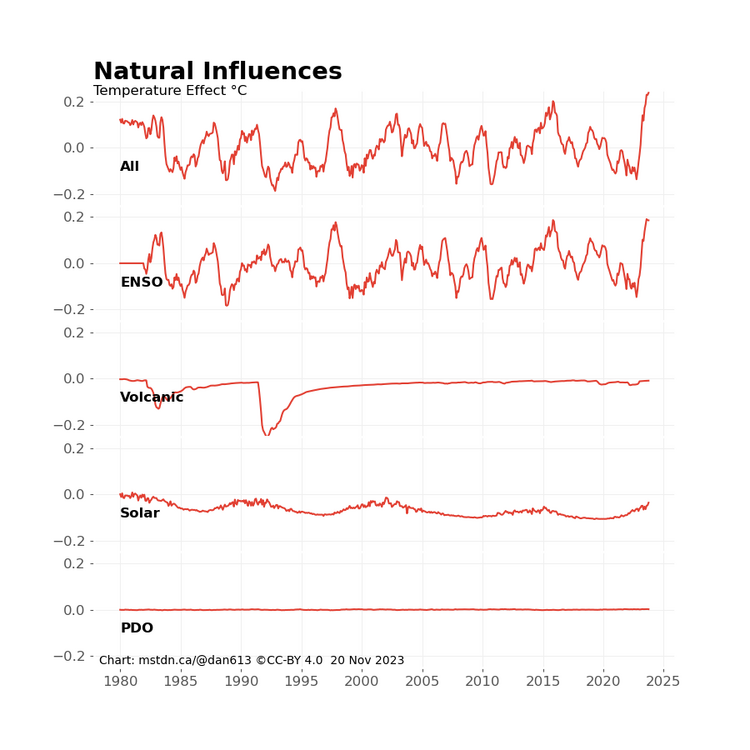
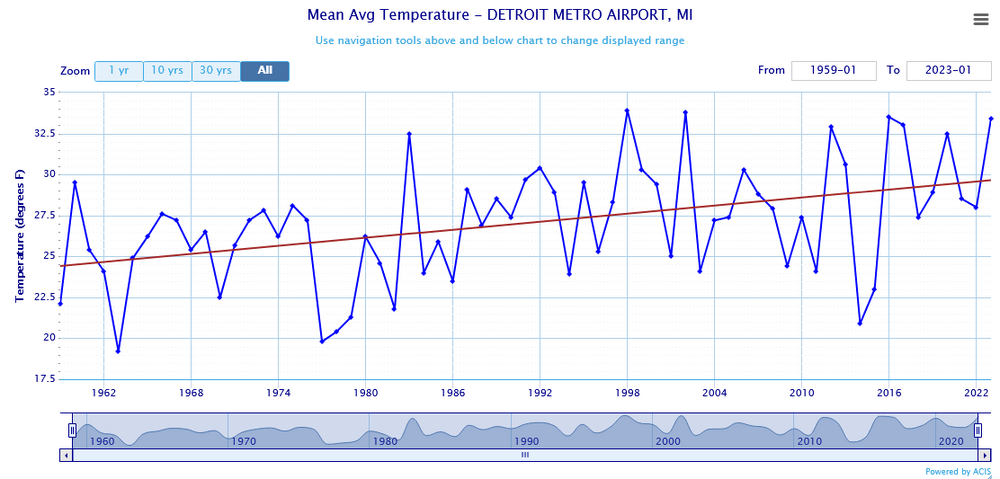
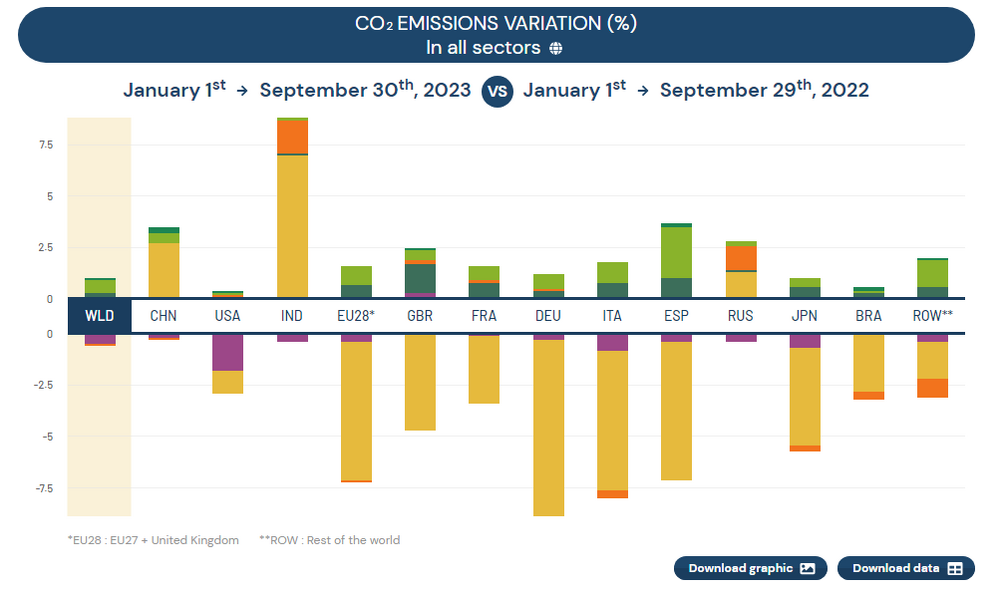
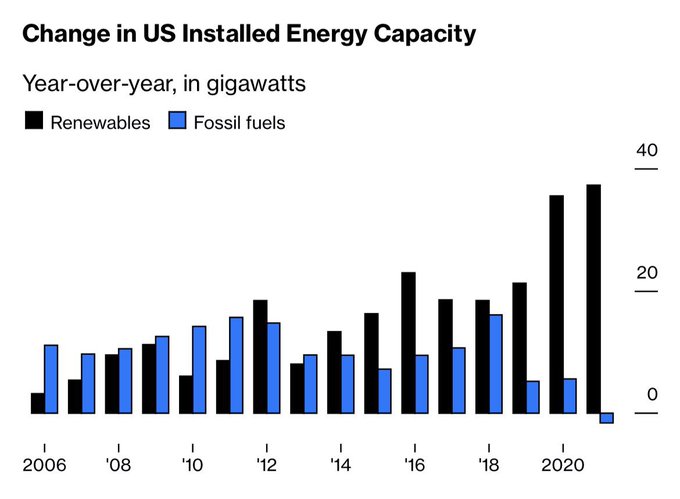
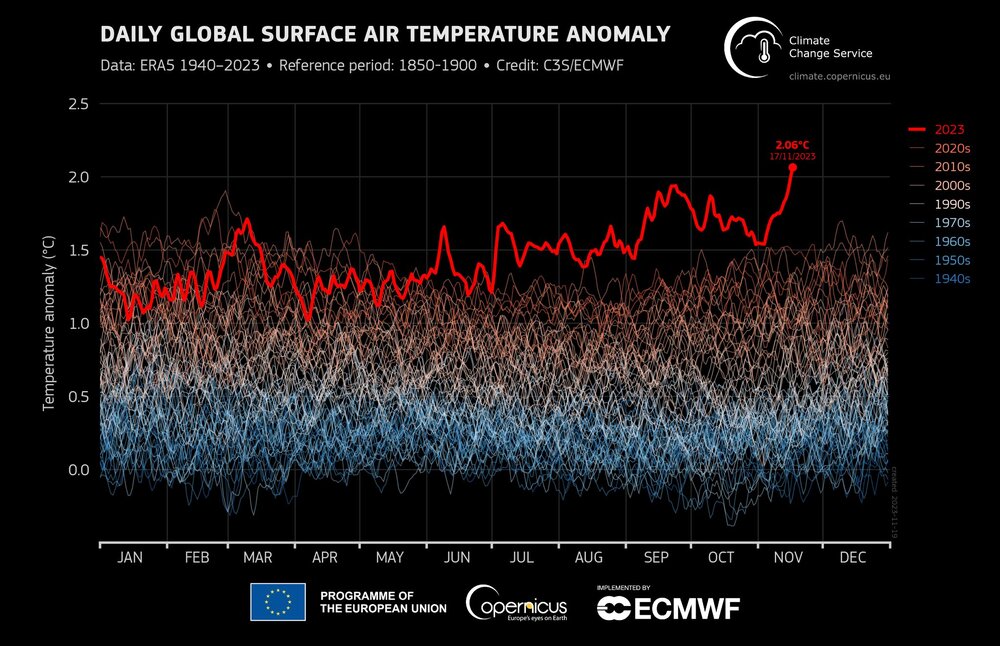
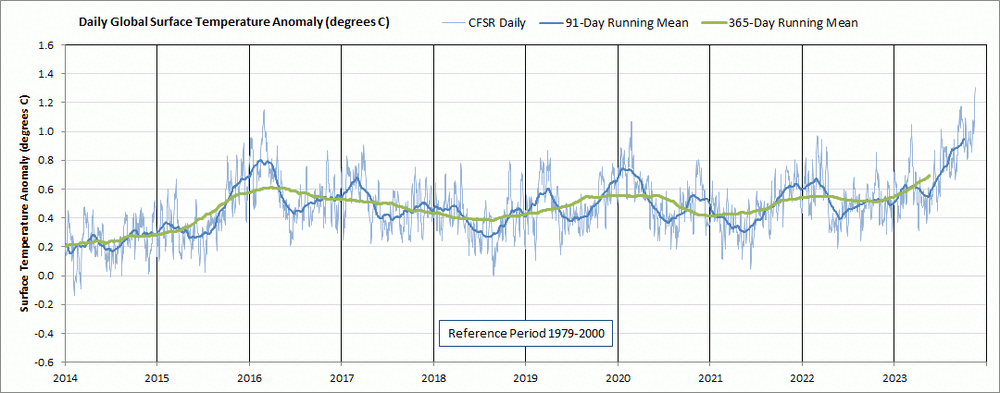
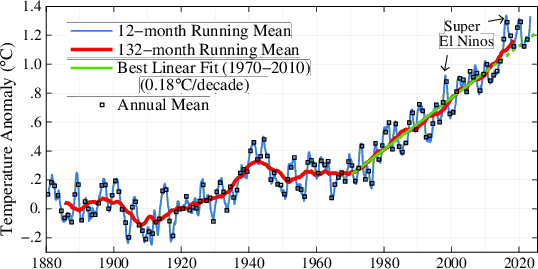

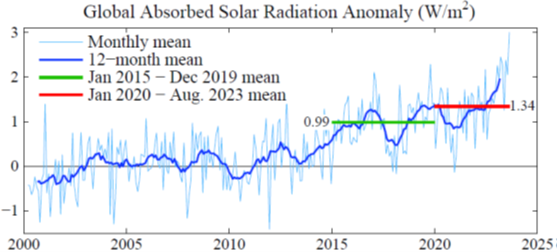
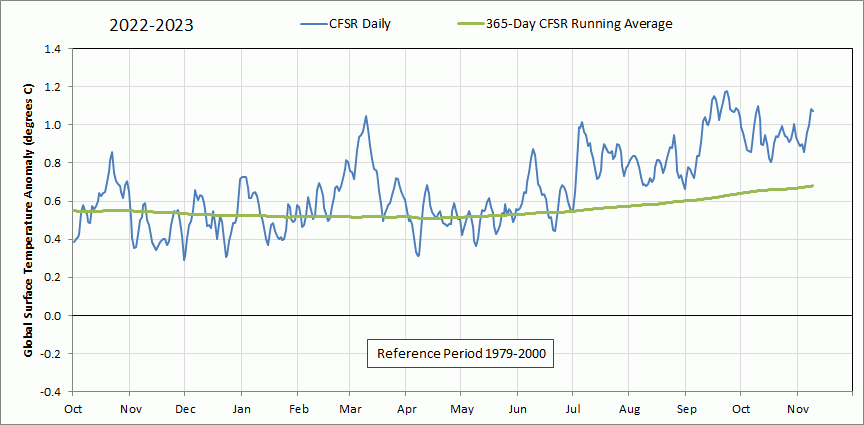
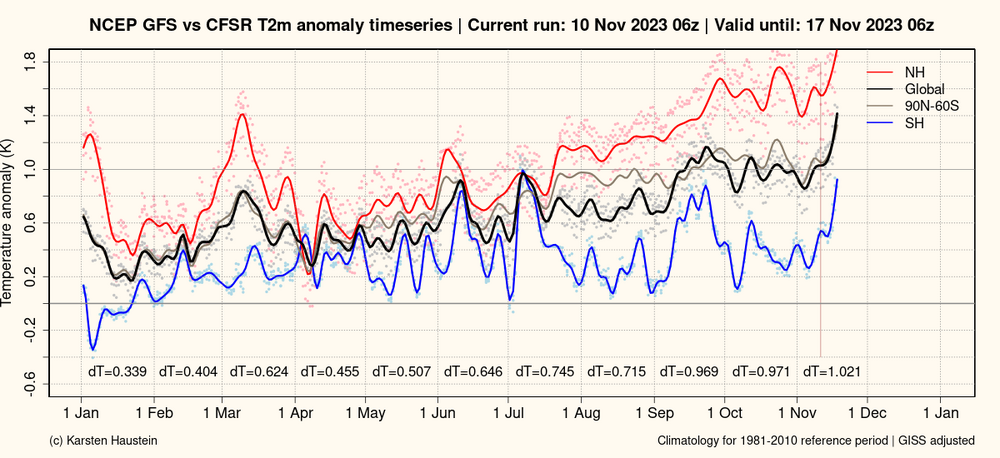

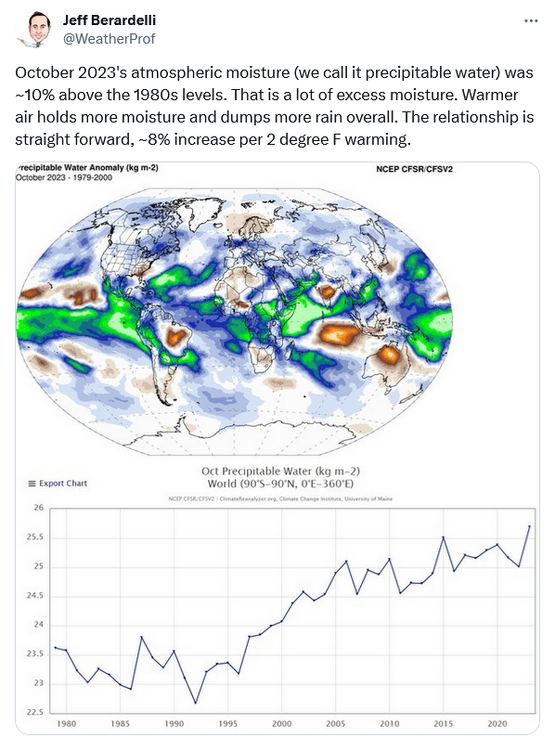
_X.thumb.png.9c07868d3f96d0a196f1aeb9f60833cc.png)
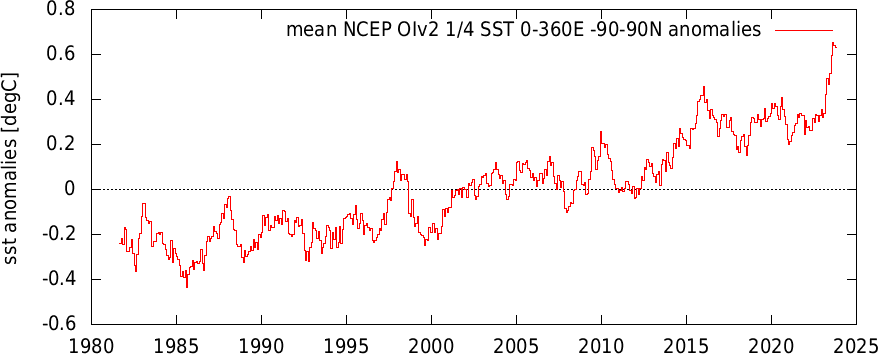
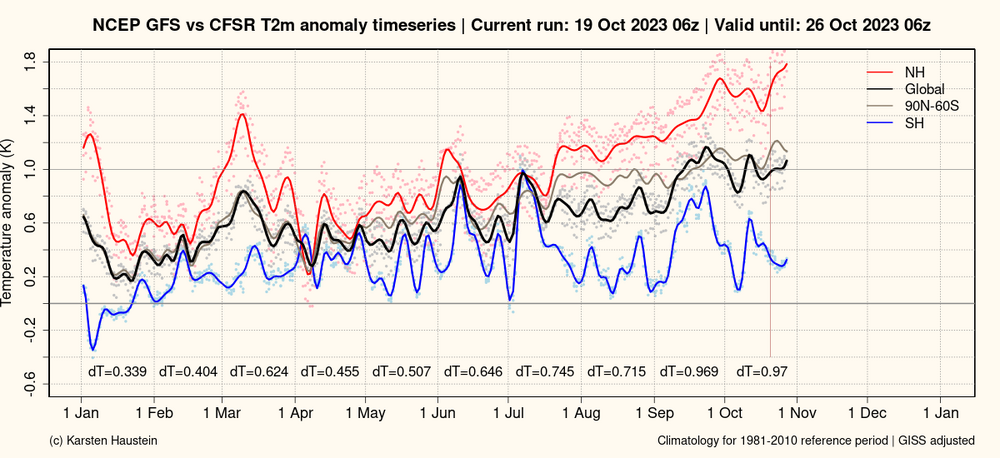
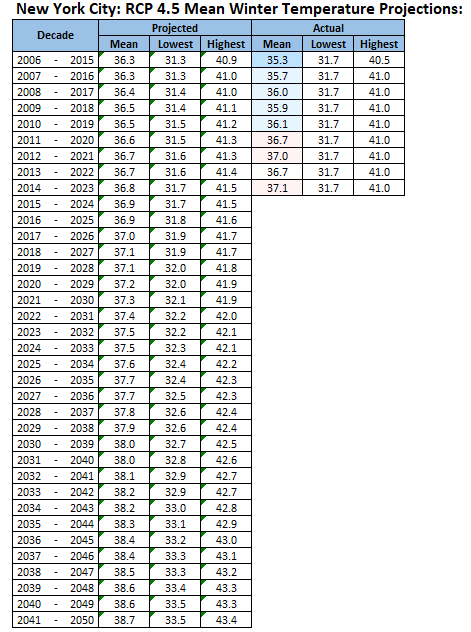
Global Average Temperature 2023
in Climate Change
Posted
Don't agree with views ascribed to either in the article. I don't think Hanson's latest paper is definitive vs all the other ECS literature. While warming has been accelerating recently, most of that can be attributed to increased forcing, due to reductions in aerosols. Also not ready to buy off on geoengineering, until more research is conducted. However I also don't think net zero is sufficient as Mann advocates. Net zero allows society to put off tough decisions, while we fill the carbon bathtub at a rapid rate. I doubt we will be able and/or willing to remove carbon at scale to make the "net" a reality or to cure "overshoot". Instead think we need to focus more on near-term emission reductions. Also need to develop the policy to support the development of viable non-carbon options for sectors that are lacking good solutions.